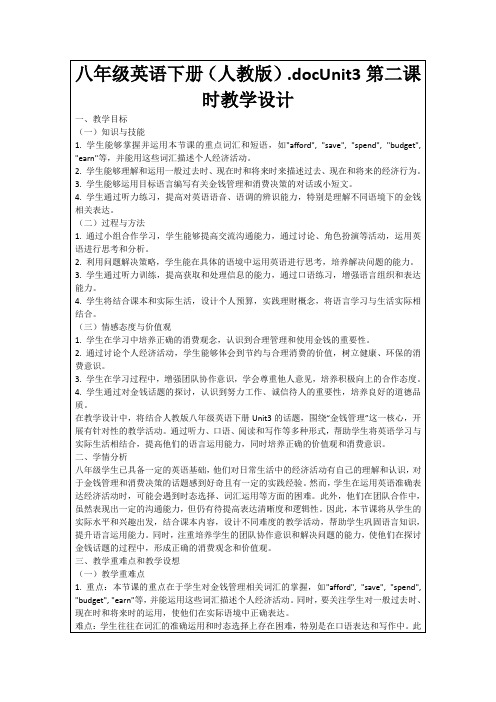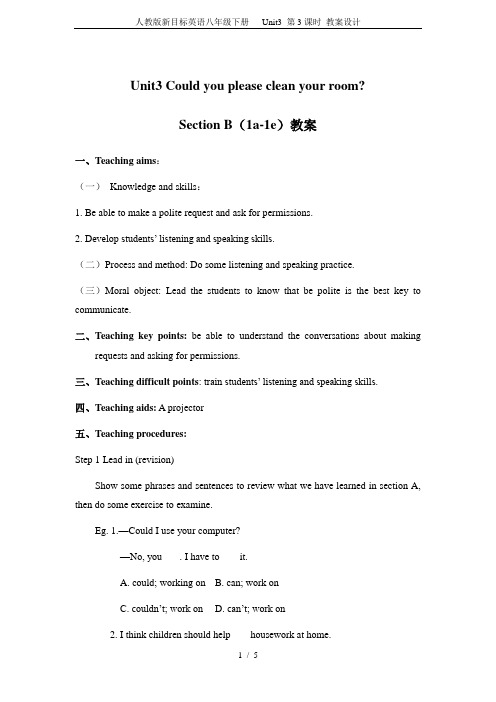八年级英语下册 Unit 3 Progress Check 3(第二课时)教
八年级英语下册(人教版).docUnit3第二课时教学设计

4.学生将结合课本和实际生活,设计人预算,实践理财概念,将语言学习与生活实际相结合。
(三)情感态度与价值观
1.学生在学习中培养正确的消费观念,认识到合理管理和使用金钱的重要性。
2.通过讨论个人经济活动,学生能够体会到节约与合理消费的价值,树立健康、环保的消费意识。
3.学生在学习过程中,增强团队协作意识,学会尊重他人意见,培养积极向上的合作态度。
4.学生通过对金钱话题的探讨,认识到努力工作、诚信待人的重要性,培养良好的道德品质。
在教学设计中,将结合人教版八年级英语下册Unit3的话题,围绕“金钱管理”这一核心,开展有针对性的教学活动。通过听力、口语、阅读和写作等多种形式,帮助学生将英语学习与实际生活相结合,提高他们的语言运用能力,同时培养正确的价值观和消费意识。
2.口语作业:
学生以小组为单位,录制一段关于金钱管理的对话,话题可以包括购物、旅游、预算制定等。要求对话中包含本节课的重点词汇和时态,每个小组成员都要有发言。此作业旨在提高学生的口语表达能力,同时加强团队合作。
3.听力作业:
学生需要在家中观看一段与金钱管理相关的英语视频或听力材料,并完成相应的听力练习。这些练习旨在帮助学生提高听力理解能力,特别是在捕捉关键信息和处理复杂句子结构方面。
二、学情分析
八年级学生已具备一定的英语基础,他们对日常生活中的经济活动有自己的理解和认识,对于金钱管理和消费决策的话题感到好奇且有一定的实践经验。然而,学生在运用英语准确表达经济活动时,可能会遇到时态选择、词汇运用等方面的困难。此外,他们在团队合作中,虽然表现出一定的沟通能力,但仍有待提高表达清晰度和逻辑性。因此,本节课将从学生的实际水平和兴趣出发,结合课本内容,设计不同难度的教学活动,帮助学生巩固语言知识,提升语言运用能力。同时,注重培养学生的团队协作意识和解决问题的能力,使他们在探讨金钱话题的过程中,形成正确的消费观念和价值观。
人教版新目标英语八年级下册 Unit3 第3课时 教案设计

Unit3 Could you please clean your room?Section B(1a-1e)教案一、Teaching aims:(一)Knowledge and skills:1. Be able to make a polite request and ask for permissions.2. Develop students’ listening and speaking skills.(二)Process and method: Do some listening and speaking practice.(三)Moral object: Lead the students to know that be polite is the best key to communicate.二、Teaching key points:be able to understand the conversations about makingrequests and asking for permissions.三、Teaching difficult points: train students’ listening and speaking skills.四、Teaching aids: A projector五、Teaching procedures:Step 1 Lead in (revision)Show some phrases and sentences to review what we have learned in section A, then do some exercise to examine.Eg. 1.—Could I use your computer?—No, you ___. I have to ___ it.A. could; working onB. can; work onC. couldn’t; work onD. can’t; work on2. I think children should help ___ housework at home.A. toB. withC. forD. of3. Could you please _________ (make)your bed.4. Mary______ (make) her bed every day.5. Look! my mother ____________ (fold) the clothes6. He _______ (sweep)the floor and _______ (take) out the rubbish yesterday . Step 2 Presentation1. learn new words: listen to the tape.2.lead inLo ok at the pictures and ask students “What do your parents ask you to do?” and What do you ask your parents’ permission for?上图是图片导入3.activities 1aLet students know what they should do in this part. Say, look at items on the list. Some of these things only parents usually ask and some of them only teenagers usually ask. Ask students to complete the writing on their own books. Remind the students to write “parents” after each item parents ask teenagers to do, and write “teenagers” after each item teen agers ask their parents to do.Check the answers and try to remember these phrases.1.buy some drinks and snacks2. borrow some money3. clean your room4. invite my friends to a party5. go to the store6. use your CD player7. take out the rubbish8. make your bed4. Teach activity 1bThis activity provides guided oral practice using the target language.Point out the sample conversation, ask students to read it. Then make their own conversations by using the phrases in 1a.Parent: Could you please…?Child: Yes, sure. / Sorry, I can’t. I have to ...clean your roomtake out the rubbishChild: Could I …?Parent: Yes, you can. / No, you can’t. You ...buy some drinks and snacksborrow some moneyinvite my friends to a partygo to the storeStep 3 listening Practice1.Teach activity 1cRead the instructions. Point to the items in 1a. Say, listen to the conversation between Sandy and her mom. Please check each item they talked about.Play the recording for twice. Then correct the answers.2.Teach activity 1dThis activity gives students practice in understanding and writing the target language. Say, this time you have to write what the three people are going to do.Play the recoding again. Let students finish this part. Then correctthe answers.Step 4 Consolidation: teach activity 1eThis activity provides guided oral practice using the target language. imagine, one student has the party and ask for help to do chores. And then try to write on the paper.Step 5 SummaryIn this period, we have mainly done some listening and speaking practice to consolidate the target language. Through the practice, we also developed our listening and speaking skills.Step 6 Homework1.Remember the words and phrases in 1a.2.To preview the e-mail message on P22, finish 2c,2d.。
人教版PEP初中八年级英语下册第三单元Unit 3教学教案

Unit 3 Could you please clean your room?话题Topic 家务琐事与许可(Chores and permission)功能Functions1.能礼貌地提出要求2.能向别人征询许可语法Grammar1.能用could礼貌地提出要求(Could for polite requests)2.能用could征询许可(Could for permission )词汇和常用表达Words & expressions 1.能正确使用下列词汇 (按词性排列)rubbish,floor,mess,shirt,finger,snack,stress,waste,fairness, neighbor,fold,sweep,throw,pass,borrow,lend,hate,provide, depend,develop,drop,neither,anyway,ill,fair,unfair,while, since2.能正确使用下列常用表达take out the rubbish,all the time,as soon as,in order to,depend on,take care of3.能认读下列词汇chore,independence,independent学习策略Strategies 1.通过略读快速了解文章大意2.利用语块整体记忆词汇文化知识Culture 有关家务劳动三维目标Three-dimensionaltarget 知识与技能1.能掌握以下单词:rubbish,fold,sweep,floor,mess,throw,neither,shirt,pass,borrow,lend,finger,hate,while,stress,waste,provide,anyway,depend,develop,fairness,since,neighbor,ill,drop,fair,unfair2.熟练掌握短语:take out the rubbish,in order to,take care of,make one’sbed,stay out late,hang out,the earlier...,the better...,all the time,depend on,as soon as,do the dishes,get a ride,come over,be angry with,in surprise 3.能掌握以下句型:Could you please do sth.?I have to do some work.Could I do sth.?She won’t be happy if she sees this mess.For one week,she did not do any housework and neither did I.My mom came over as soon as I sat down in front of the TV.主语+hate+(to do/doing) sth.4.学会用could礼貌地请求和征求许可。
八年级英语冀教版第三单元教学计划

八年级英语冀教版第三单元教学计划8th Grade English Ji Edition Unit Three Teaching PlanI. Teaching Goals:1. To help students understand and use vocabulary related to daily routines.2. To enable students to talk about their daily routines in English.3. To develop students' listening, speaking, reading, and writing skills.4. To encourage students to work cooperatively in pairs or groups.5. To familiarize students with the use of present simple tense in daily routines.II. Teaching Content:1. Vocabulary: wake up, brush teeth, have breakfast, go to school, have lunch, do homework, watch TV, go to bed, etc.2. Grammar: present simple tense in daily routines.3. Listening: listening for specific information about people's daily routines.4. Speaking: describing and discussing daily routines.5. Reading: reading short passages about daily routines.6. Writing: writing about their own daily routines.III. Teaching Procedures:1. Warm-up (5 minutes):- Start the lesson by asking students to name as many daily routines as they can think of in English.- Play a quick game of charades where students act out a daily routine and the other students have to guess what it is.- Introduce the topic of daily routines and explain the importance of being able to talk about them in English.2. Vocabulary Introduction (15 minutes):- Introduce key vocabulary related to daily routines using flashcards or visuals.- Practice pronunciation and drill the vocabulary with the whole class.- Have students repeat the words and practice using them in sentences.3. Listening Activity (20 minutes):- Play a recording of people talking about their daily routines.- Have students listen for specific information, such as what time they wake up or what they do after school.- Ask comprehension questions to check students' understanding of the listening activity.4. Speaking Practice (20 minutes):- Have students work in pairs to discuss their own daily routines.- Encourage students to ask each other questions and make comparisons between their routines.- Monitor students' conversations and provide feedback on pronunciation and vocabulary usage.5. Reading Comprehension (15 minutes):- Hand out short passages about different people's daily routines.- Ask students to read the passages and answer comprehension questions about the contents.- Discuss the passages as a class and have students share their thoughts on the different routines.6. Grammar Focus (15 minutes):- Introduce the present simple tense and how it is used to talk about daily routines.- Provide examples and have students practice forming sentences using the present simple tense.- Give students time to write sentences about their own daily routines using the present simple tense.7. Writing Activity (20 minutes):- Have students write a short paragraph about their daily routines.- Encourage students to use the vocabulary and grammar structures they have learned in the lesson.- Ask students to read their paragraphs aloud to the class or to a partner for feedback.8. Review and Closure (10 minutes):- Review key vocabulary, grammar points, and concepts covered in the lesson.- Ask students to summarize what they have learned about daily routines in English.- Assign homework that reinforces the lesson, such as writing a diary entry about a typical day.IV. Teaching Aids:- Flashcards with key vocabulary- Audio recordings of people talking about their daily routines- Reading passages about daily routines- Whiteboard and markers- Worksheets for writing activities- Timer or countdown clockV. Assessment:- Monitor students' participation in speaking activities- Check comprehension of listening activities through questions- Collect and review written work for accuracy and understanding of grammar and vocabulary- Use informal assessments to gauge student progress throughout the lessonVI. Homework:- Write a diary entry describing a typical day- Review vocabulary and grammar points learned in classVII. Reflection:- After the lesson, reflect on what worked well and what could be improved for future lessons- Consider any adjustments that could be made to enhance student learning and engagement- Plan for follow-up activities or reinforcement of key concepts in upcoming lessonsBy following this detailed teaching plan, students will have the opportunity to engage with the topic of daily routines in English in a fun and interactive way. This unit will help them build their vocabulary, improve their speaking and listening skills, and gain a better understanding of the present simple tense.。
初二年级英语下册教学计划:Unit 3 第二课时

Interview two classmates in your class and write down their answers .Begin like this :What were you doing at ? I was . Homework : Cover the story in 3a .Try to retell the story . 小编为大家提供的初二年级英语下册教学计划就到这里了,愿大家都能在 学期努力,丰富自己,锻炼自己。
SB Page 20 , 3b . Cover the story .Look at the pictures and take turns to tell the story . I think this activity is hard to most of the students . If necessary , do it as homework . SB Page 20 , Part 4 . What were you doing at these times last Sunday ? 1. Read the sample dialogue in the box . 2. Look at the table .Read the times for the Ss . 3. Pairwork : Talk about what they were doing at different times . 4. Write down your answers . 5. Practice reading . Step 3 Post-task Make an interview .
人教版初中八年级英语下册第三单元Unit3教案含教学反思

⼈教版初中⼋年级英语下册第三单元Unit3教案含教学反思Section A 单词rubbish n.垃圾;废弃物fold v.折叠;对折sweep v.(swept)扫;打扫floor n.地板mess n.杂乱;不整洁throw v.(threw)扔;掷neither adv.也不; pron.两者都不shirt n.衬衫pass v.给;递;⾛过;通过borrow v.借;借⽤lend v.(lent)借给;借出finger n.⼿指hate v.厌恶;讨厌while conj.与……同时;当……的时候;⽽;然⽽chore n.杂务;乏味⽆聊的⼯作snack n.点⼼;⼩吃;快餐短语take out the rubbish 倒垃圾all the time频繁;反复as soon as ⼀……就……句型1.Peter,could you please take out the rubbish? 彼得,你能把垃圾倒了吗?2.And she won’t be happy if she sees this mess.⽽且如果她看到这么乱,她会不⾼兴的。
3.Could I at least finish watching this show?⾄少等我看完这个节⽬可以吗?4.For one week, she did not do any housework and neither did I.在—周时间⾥,她没有做任何家务,我也没有做。
that everyone should do their part in keeping it clean and tidy.既然他们和⽗母⽣活在同⼀所房⼦⾥,他们就应该知道每个⼈都应该为保持房屋的⼲净和整洁尽⼀份⼒。
5.The earlier kids learn to be independent,the better it is for their future.孩⼦们越早学会独⽴,对他们的未来就越好。
八下第三单元第二课时课件

1.The boy was walking down the street when the UFO landed.
2.The girl was shopping when the alien got out. 3.While the girl was shopping, the alien got out. 4.While the boy was walking down the street, the UFO
❖ Knowledge is power. 知识就是力量。
▪ Pay attention to your pronunciation . 请注意你的发音。
❖It’s your turn now . 该你了(轮到你了)。
➢Think it over and try again . 仔细想想,再试。
Learn these words by heart . 用心学这些单词。
landed.
Grammar Focus
过去进行时用于when 和while 引导的时间状语从句及其区别
1.用when引导的时间状语从句说明一个动作发生时,另一个动 作正在进行。
The students were drawing pictures when the teacher came in. 2.用when引导的时间状语从句也可表示正在进行某一动作时,
with “ While riding street, off.
tatwhhWtsUbeehhoiFbemkUehOoeewnFeyntoOo”thwnomtihatnettaoehnhrgnoeeeUdkawpFb“oaoOostlsoutfircwottsteeokahtemohhyetoki,eiatfnClhfnoeg.eef.”nfU,.tetsapFrheniOeceditnmutgraaektnshi.nwingagss
新人教版八年级下册英语 Unit 3 第2课时 教案(教学设计)

Reading
(3a)
1. Let Ss look at the picture and discuss the questions.
① What does the picture show?
② What household chores need to be done in this house?
通过讨论,使学生进一步理解文章,并对其进行思想教育,同时可锻炼学生的口语表达能力。
教学环节
教师活动
学生活动
备课札记
Step 4
(3c)
Let Ss decide whether the underlined words in the sentences are verbs or nouns. Then write another sentence using the underlined word in the other form.
A: Sure. I’ll finish my homework while you help me with the dishes. Then we can go to the movies.
4c. Make a list of things your group needs to do for a camping trip. Then discuss who will do them and complete the chart.
Step 5
Grammar
Focus
1. Let Ss read the sentences in Grammar Focus.
2. Let Ss recite the sentences.
Ss read and recite the sentences in Grammar Focus.
